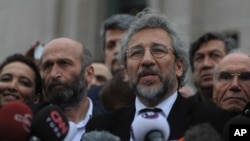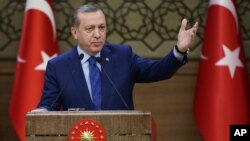A diplomatic dispute between Ankara and its Western allies continues to grow over the presence of senior foreign diplomats at the trial of two Turkish journalists. Turkey's Justice and Foreign ministries are accusing the diplomats of interference in Turkey’s judiciary.
"Unacceptable," tweeted Turkish Justice Minister Bekir Bozdag, irked by the presence of foreign diplomats at Friday’s trial of journalists Can Dundar and Erdem Gul.
Consular representatives from many of Turkey’s key Western allies were in the courtroom. If convicted, the journalists face life imprisonment for articles accusing the government of arms smuggling to Syrian jihadists.
The large turnout of senior diplomats was widely interpreted as a show of support for Dundar and Gul, whose trial has been strongly criticized internationally.
The Turkish Foreign Ministry also expressed concern Monday and said it had lodged formal complaints.
The criticism comes after President Recep Tayyip Erdogan strongly criticized his allies Saturday.
Speaking about the consuls-general in Istanbul who attended the trial, he asked, "Who are you? What business do you have there?" Diplomacy has a certain propriety and manners he said, referring to the diplomats. "This is not your country."
Turkey’s dominant pro-government media echoed those sentiments. One newspaper’s headline read, “Crusader Unity for Journalists,” while another said, “Invasion of the Courtroom.”
Move seen as pandering
Images and rhetoric of Western imperialism threatening Turkey play well with Erdogan’s religious-nationalist base, says political columnist Semih Idiz of Turkey’s Cumhuriyet newspaper and Al Monitor website.
"I think it's mainly for his own supporters, to drum up support for himself in Turkey. He is still pushing for a constitutional change, to make him an executive president. And he is pandering to his constituents' populist sentiments, and this kind of thing also plays into the nationalist sentiment. They are completely taken by it; they have no doubts about this (what Erdogan says) whatsoever,” Idiz says.
The diplomatic spat comes amid already strained relations between Ankara and its Western allies over growing concerns for human rights and democracy.
Turkey, which borders Syria and Iraq, remains a crucial ally in the fight against the Islamic State and in stemming the flood of refugees into Europe. Columnist Idiz says the dispute likely will only add to already existing concerns about the president.
"He is clearly not popular in the West and is not doing much to help raise confidence in the West; but, they will maintain their attention and focus. Prime Minister [Ahmet] Davutoglu, quite on the contrary, is going on about a new chapter in Turkish-Western and EU relations. He even has repeated a number of times recently that Turkey is a European country and all that," Idiz says.
Davutoglu is increasingly being presented in Western circles and by domestic critics of the president as a voice of reason in Ankara. The diplomatic tension is likely to add to that view, analysts point out; but, they say the prime minister remains an isolated figure, with Erdogan’s iron grip on the ruling AK Party and with most government ministers deferring to him.





